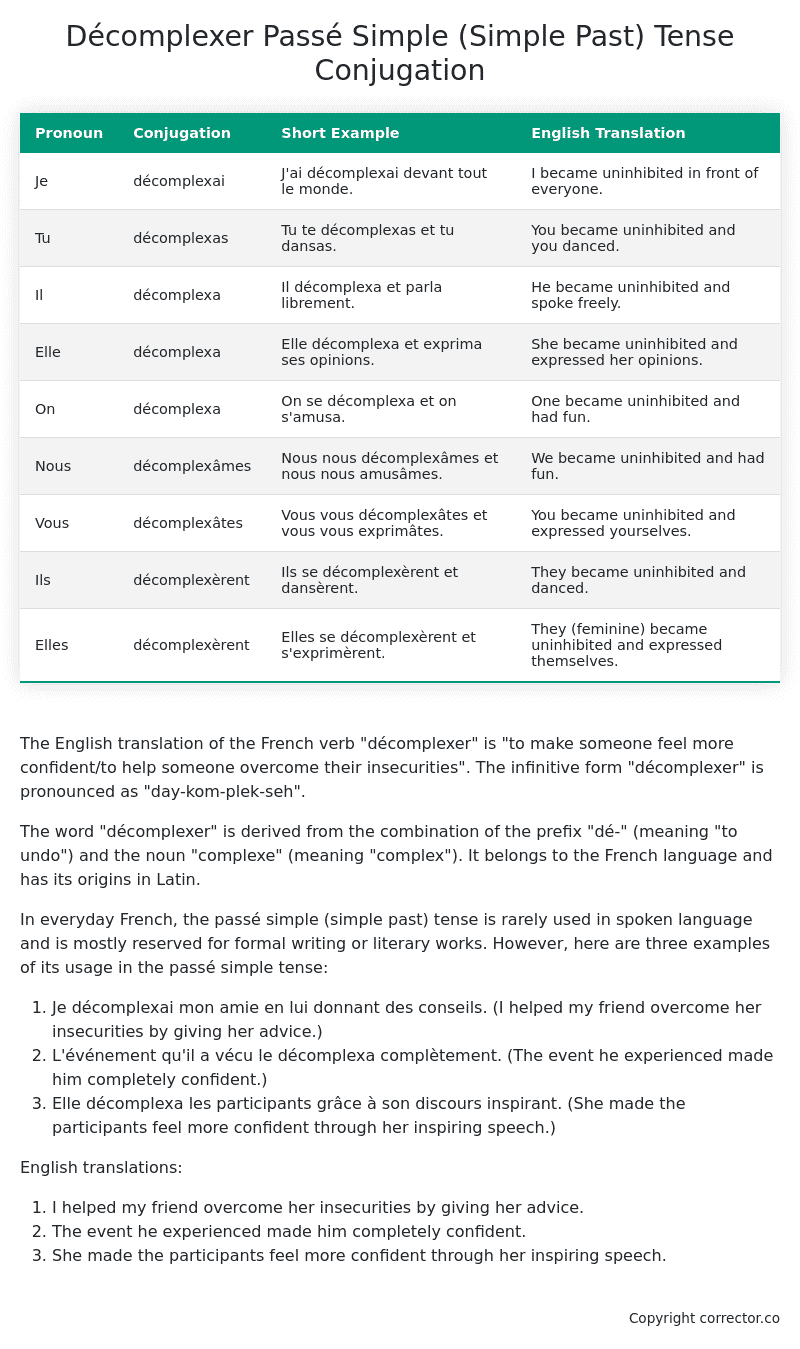Passé Simple (Simple Past) Tense Conjugation of the French Verb décomplexer
Introduction to the verb décomplexer
The English translation of the French verb “décomplexer” is “to make someone feel more confident/to help someone overcome their insecurities”. The infinitive form “décomplexer” is pronounced as “day-kom-plek-seh”.
The word “décomplexer” is derived from the combination of the prefix “dé-” (meaning “to undo”) and the noun “complexe” (meaning “complex”). It belongs to the French language and has its origins in Latin.
In everyday French, the passé simple (simple past) tense is rarely used in spoken language and is mostly reserved for formal writing or literary works. However, here are three examples of its usage in the passé simple tense:
- Je décomplexai mon amie en lui donnant des conseils. (I helped my friend overcome her insecurities by giving her advice.)
- L’événement qu’il a vécu le décomplexa complètement. (The event he experienced made him completely confident.)
- Elle décomplexa les participants grâce à son discours inspirant. (She made the participants feel more confident through her inspiring speech.)
English translations:
- I helped my friend overcome her insecurities by giving her advice.
- The event he experienced made him completely confident.
- She made the participants feel more confident through her inspiring speech.
Table of the Passé Simple (Simple Past) Tense Conjugation of décomplexer
| Pronoun | Conjugation | Short Example | English Translation |
|---|---|---|---|
| Je | décomplexai | J’ai décomplexai devant tout le monde. | I became uninhibited in front of everyone. |
| Tu | décomplexas | Tu te décomplexas et tu dansas. | You became uninhibited and you danced. |
| Il | décomplexa | Il décomplexa et parla librement. | He became uninhibited and spoke freely. |
| Elle | décomplexa | Elle décomplexa et exprima ses opinions. | She became uninhibited and expressed her opinions. |
| On | décomplexa | On se décomplexa et on s’amusa. | One became uninhibited and had fun. |
| Nous | décomplexâmes | Nous nous décomplexâmes et nous nous amusâmes. | We became uninhibited and had fun. |
| Vous | décomplexâtes | Vous vous décomplexâtes et vous vous exprimâtes. | You became uninhibited and expressed yourselves. |
| Ils | décomplexèrent | Ils se décomplexèrent et dansèrent. | They became uninhibited and danced. |
| Elles | décomplexèrent | Elles se décomplexèrent et s’exprimèrent. | They (feminine) became uninhibited and expressed themselves. |
Other Conjugations for Décomplexer.
Le Present (Present Tense) Conjugation of the French Verb décomplexer
Imparfait (Imperfect) Tense Conjugation of the French Verb décomplexer
Passé Simple (Simple Past) Tense Conjugation of the French Verb décomplexer (You’re reading it right now!)
Passé Composé (Present Perfect) Tense Conjugation of the French Verb décomplexer
Futur Simple (Simple Future) Tense Conjugation of the French Verb décomplexer
Futur Proche (Near Future) Tense Conjugation of the French Verb décomplexer
Plus-que-parfait (Pluperfect) Tense Conjugation of the French Verb décomplexer
Passé Antérieur (Past Anterior) Tense Conjugation of the French Verb décomplexer
Futur Antérieur (Future Anterior) Tense Conjugation of the French Verb décomplexer
Subjonctif Présent (Subjunctive Present) Tense Conjugation of the French Verb décomplexer
Subjonctif Passé (Subjunctive Past) Tense Conjugation of the French Verb décomplexer
Subjonctif Imparfait (Subjunctive Imperfect) Tense Conjugation of the French Verb décomplexer
Conditionnel Présent (Conditional Present) Tense Conjugation of the French Verb décomplexer
Conditionnel Passé (Conditional Past) Tense Conjugation of the French Verb décomplexer
Conditionnel Passé II (Conditional Past II) Tense Conjugation of the French Verb décomplexer
L’impératif Présent (Imperative Present) Tense Conjugation of the French Verb décomplexer
L’impératif Passé (Imperative Past) Tense Conjugation of the French Verb décomplexer
L’infinitif Présent (Infinitive Present) Tense Conjugation of the French Verb décomplexer
L’infinitif Passé (Infinitive Past) Tense Conjugation of the French Verb décomplexer
Le Participe Présent (Present Participle) Tense Conjugation of the French Verb décomplexer
Le Participe Passé (Past Participle) Tense Conjugation of the French Verb décomplexer
Struggling with French verbs or the language in general? Why not use our free French Grammar Checker – no registration required!
Get a FREE Download Study Sheet of this Conjugation 🔥
Simply right click the image below, click “save image” and get your free reference for the décomplexer Passé Simple tense conjugation!

Décomplexer – About the French Passé Simple (Simple Past) Tense
Formation
Usage
Narration
Historical Context
Interactions with other tenses
Passé Composé
Imparfait
Conditional and Subjunctive
Summary
I hope you enjoyed this article on the verb décomplexer. Still in a learning mood? Check out another TOTALLY random French verb conjugation!


